MATLAB Testing Tools
Overview
This tutorial explains the main features of srsRAN-matlab, a MATLAB-based project for testing srsRAN Project. More specifically, this tutorial will show how to generate a new set of test vectors for the srsRAN Project tests, how to analyze the uplink IQ samples recorded by srsRAN gNB, and how to run end-to-end, link-level simulations for testing PHY components of srsRAN Project. This will be done across three independent sections.
srsRAN-matlab offers three main tools: the test vector generators, the uplink analyzers and the link-level simulators.
Test Vector Generation
Test vectors are mainly used to test, develop and debug the PHY components of the srsRAN Project. This tutorial will show how to generate the set of vectors used for unit testing inside the srsRAN repository. As well as outlining how to generate a new set of random vectors for broadening the extent of the tests.
Signal Analyzers
The signal analyzers are useful for testing the uplink chain of the gNB. Specifically, they provide visual hints about the signal quality in the uplink slots.
Simulators
The simulators can be used to estimate the performance of the PHY uplink channels under different configurations and channel conditions provided by MATLAB’s 3GPP-compliant models.
Set-Up Considerations
For this application note, the following hardware and software are used:
A PC with Ubuntu 22.04.3 LTS
MathWorks MATLAB (R2022b or R2023a) with the 5G Toolbox
Note
Running the srsRAN-matlab testing suite requires a working copy of MATLAB and its 5G Toolbox
Installation
Assuming that srsRAN Project and MATLAB have both been downloaded and installed, the next step is to download srsRAN-matlab.
This can be done with the following command:
git clone https://github.com/srsran/srsRAN_matlab.git
Note
This tutorial assumes that srsRAN Project is installed in the users come directory.
Once it has been downloaded, the working directory for srsRAN-matlab should be added to MATLAB’s search path. This can be done from the MATLAB console with the following command:
cd ~/srsRAN_matlab
addpath .
To verify you have added srsRAN-matlab successfully to MATLAB’s search path, run the following command (again from the MATLAB console):
runtests('unitTests', Tag='matlab code')
If successful, the following output should be shown at the end of the console output:
ans =
1x94 TestResult array with properties:
Name
Passed
Failed
Incomplete
Duration
Details
Totals:
94 Passed, 0 Failed, 0 Incomplete.
42.2176 seconds testing time.
The PHY components of srsRAN Project are tested by feeding each component with vectors of input data and
comparing the resulting output with their expected values. In srsRAN Project, the test vectors for a
PHY component usually consist of a number of binary files with input and output data, and a single shared header file
that describes the test set-up and the content of the binary files. The binary files are packed in a single tarball.
For example, the test vectors of the channel estimator are provided by the files port_channel_estimator_test_data.h and
port_channel_estimator_test_data.tar.gz in ~/srsRAN_Project/tests/unittests/phy/upper/signal_processors.
The files srs<ComponentName>Unittest.m in the main directory of srsRAN-matlab provide the classes for
generating such PHY input-output test vectors. This is done by leveraging MATLAB 5G Toolbox. These classes inherit from
the MATLAB matlab.unittest.TestCase class, meaning all of the tools within MATLAB’s unit
testing framework can be used with them. To facilitate the generation of test vectors, a simplified interface
is provided with srsRAN-matlab.
To generate the test vectors for all PHY components the following code needs to be run from the MATLAB console:
runSRSRANUnittest('all', 'testvector')
This will generate a .h and .tar.gz file for each of the PHY components and place them in the folder ~/srsRAN_matlab/testvector_outputs..
The test vectors for a single PHY component can also be generated. This is done by replacing all with the name of the desired
component, as per its declaration in ~/srsRAN_Project/include/srsran/. For example, the test vectors for the channel estimator,
whose interface is declared in ~/srsRAN_Project/include/srsran/phy/upper/signal_processors/port_channel_estimator.h, can be
generated with the following command:
runSRSRANUnittest('port_channel_estimator', 'testvector')
Once the test vectors have been generated, the pairs of .h and tar.gz files in the testvector_outputs folder
can be transferred to the srsRAN Project folder with the MATLAB command:
srsTest.copySRStestvectors('testvector_outputs', '~/srsRAN_Project/')
This command will automatically copy all test vectors to the proper subdirectory inside ~/srsRAN_Project/tests/unittests/phy.
By default, executing runSRSRANUnittest will reproduce the same test vectors as the ones provided with
the srsRAN Project repository. To generate a random set of vectors, we simply need to add the RandomShuffle
option. This can be done with the following command:
runSRSRANUnittest('all', 'testvector', RandomShuffle=true)
srsRAN-matlab provides some tools to analyze the signal received by the srsRAN gNB and help debugging the uplink channels. These
can be found in apps/analyzers. In this tutorial, we will focus on the analyzer for PUSCH transmissions; for the other
analyzers, which are very similar, please follow the instruction in their help text.
The following shows some of the other analyzer options:
% The Resource Grid analyzers only plots the energy map of a slot.
>> help srsResourceGridAnalyzer
% For analyzing PUCCH transmissions.
>> help srsPUCCHAnalyzer
% For analyzing PRACH transmissions.
>> help srsPRACHAnalyzer
To use the PUSCH analyzer, the gNB needs to be configured to collect IQ samples. This can be done with by adding the following to the gNB configuration file:
log:
filename: /tmp/gnb.log # save the log to a specified file
phy_level: debug # debug log level for PHY layer set to debug
phy_rx_symbols_filename: /tmp/iq.bin # save IQ samples to a specified file
The gNB can then be run as normal. The IQ samples will then be generated. This can be done with the following command:
sudo ./gnb -c config.yml
Note
The generated IQ samples will occupy a large amount of disk space. It is recommended to not run the gNB with this configuration for too long.
After running the gNB, open the gnb.log and locate a PUSCH transmission to analyze. The following example shows the PUSCH transmission that will be
analyzed in this tutorial:
2023-10-08T19:14:54.738749 [Upper PHY] [I] [ 690.17] RX_SYMBOL: sector=0 offset=79705 size=8568
2023-10-08T19:14:54.738854 [UL-PHY1 ] [D] [ 690.17] PUSCH: rnti=0x4601 h_id=0 prb=[3, 6) symb=[0, 14) mod=QPSK rv=0 tbs=11 crc=OK iter=1.0 sinr=20.1dB t=182.0us
rnti=0x4601
h_id=0
bwp=[0, 51)
prb=[3, 6)
symb=[0, 14)
oack=0
ocsi1=0
part2=entries=[]
alpha=0.0
betas=[0.0, 0.0, 0.0]
mod=QPSK
tcr=0.1171875
rv=0
bg=2
new_data=true
n_id=1
dmrs_mask=00100001000100
n_scr_id=1
n_scid=false
n_cdm_g_wd=2
dmrs_type=1
lbrm=3168bytes
slot=690.17
cp=normal
nof_layers=1
ports=0
dc_position=306
crc=OK
iter=1.0
max_iter=1
min_iter=1
nof_cb=1
sinr_ch_est=26.9dB
sinr_eq=23.9dB
sinr_evm[sel]=20.1dB
evm=0.06
epre=+22.7dB
rsrp=+22.7dB
t_align=-0.2us
Once the transmission has been located and selected, its description can be used to populate configuration options in the srsRAN-matlab analyzer.
From the MATLAB console, run the following command:
cd apps/analyzers
[carrier, pusch, extra] = srsParseLogs
You will then see the following output:
Copy the relevant section of the logs to the system clipboard (typically select and Ctrl+C), then switch back to MATLAB and press any key.
Parsing the following log section:
You should then copy the selected PUSCH transmission details from the log file, and paste it directly into the MATLAB console. The output should look like the following:
2023-10-08T19:14:54.738854 [UL-PHY1 ] [D] [ 690.17] PUSCH: rnti=0x4601 h_id=0 prb=[3, 6) symb=[0, 14) mod=QPSK rv=0 tbs=11 crc=OK iter=1.0 sinr=20.1dB t=182.0us
rnti=0x4601
h_id=0
bwp=[0, 51)
prb=[3, 6)
symb=[0, 14)
oack=0
ocsi1=0
part2=entries=[]
alpha=0.0
betas=[0.0, 0.0, 0.0]
mod=QPSK
tcr=0.1171875
rv=0
bg=2
new_data=true
n_id=1
dmrs_mask=00100001000100
n_scr_id=1
n_scid=false
n_cdm_g_wd=2
dmrs_type=1
lbrm=3168bytes
slot=690.17
cp=normal
nof_layers=1
ports=0
dc_position=306
crc=OK
iter=1.0
max_iter=1
min_iter=1
nof_cb=1
sinr_ch_est=26.9dB
sinr_eq=23.9dB
sinr_evm[sel]=20.1dB
evm=0.06
epre=+22.7dB
rsrp=+22.7dB
t_align=-0.2us
The function will show the log for confirmation and ask for the sub-carrier spacing and the number of RBs in the resource grid:
Do you want to continue? [Y]/N y
Subcarrier spacing in kHz: 30
Grid size as a number of RBs: 51
Finally, srsParseLogs returns an nrCarrierConfig object, carrier, an nrPUSCHConfig object, pusch, and the extra structure with
additional information about the PUSCH transport block. It should look like the following:
carrier =
nrCarrierConfig with properties:
NCellID: 1
SubcarrierSpacing: 30
CyclicPrefix: 'normal'
NSizeGrid: 51
NStartGrid: 0
NSlot: 17
NFrame: 690
Read-only properties:
SymbolsPerSlot: 14
SlotsPerSubframe: 2
SlotsPerFrame: 20
pusch =
nrPUSCHConfig with properties:
NSizeBWP: 51
NStartBWP: 0
Modulation: 'QPSK'
NumLayers: 1
MappingType: 'A'
SymbolAllocation: [0 14]
PRBSet: [3 4 5]
TransformPrecoding: 0
TransmissionScheme: 'nonCodebook'
NumAntennaPorts: 1
TPMI: 0
FrequencyHopping: 'neither'
SecondHopStartPRB: 1
BetaOffsetACK: 20
BetaOffsetCSI1: 6.2500
BetaOffsetCSI2: 6.2500
UCIScaling: 1
NID: 1
RNTI: 17921
NRAPID: []
DMRS: [1x1 nrPUSCHDMRSConfig]
EnablePTRS: 0
PTRS: [1x1 nrPUSCHPTRSConfig]
extra =
struct with fields:
RV: 0
TargetCodeRate: 0.1172
TransportBlockLength: 88
dcPosition: 306
The final step is to run the PUSCH analyzer, providing as inputs the objects just created by srsParseLogs,
the path to the IQ record, the offset and the length of the slot (both expressed as a number of IQ samples).
Both the offset and the length of the slot can be found in the log file, on a line like the following one
2023-10-08T19:14:54.738749 [Upper PHY] [I] [ 690.17] RX_SYMBOL: sector=0 offset=79705 size=8568
Note
The slot ID ([ 690.17] in our example) should be the same as that of the PUSCH log.
The command to run the PUSCH analyzer from the MATLAB console is:
srsPUSCHAnalyzer(carrier, pusch, extra, '/tmp/iq.bin', 79705, 8568)
The block CRC is OK.
This should then output figures displaying the slot energy distribution, the magnitude of the estimated channel, the phase of the estimated channel, the equalized constellation and the received soft bit distribution.
The following figures show these:
Slot Energy Distribution |
Magnitude of the Estimated Channel |
Phase of the Estimated Channel |
|---|---|---|
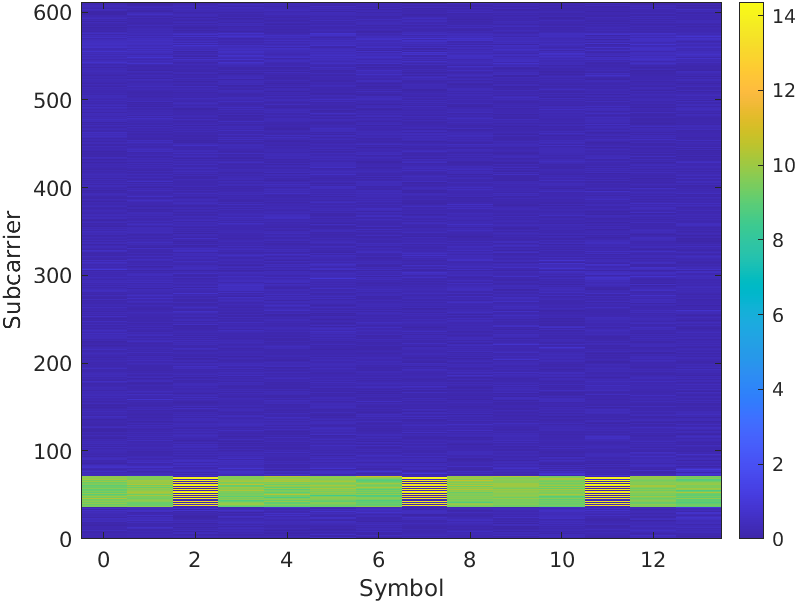
|
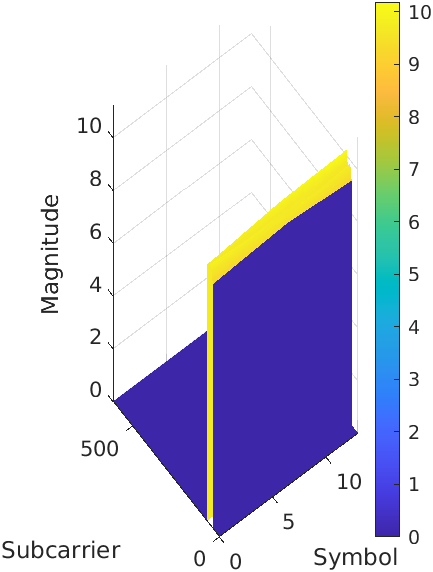
|
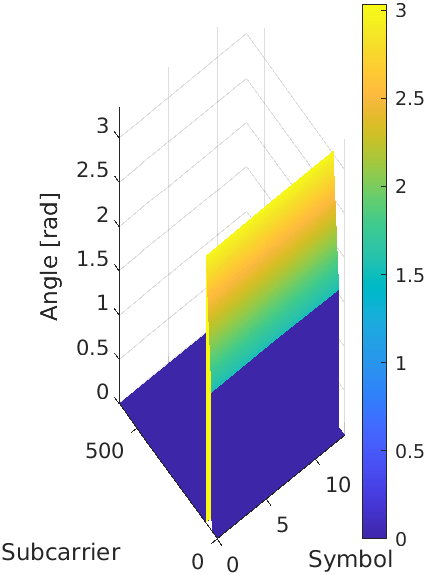
|
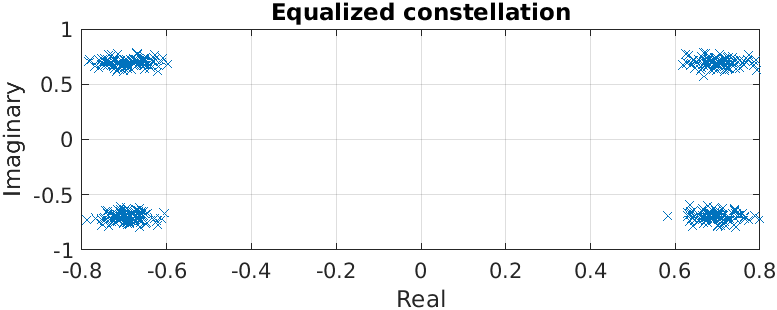
|
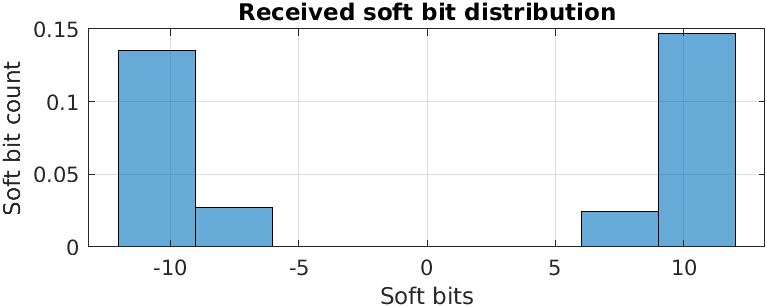
|
This example demonstrates how to test the throughput and BLER performance of the srsRAN gNB’s own PUSCH processor using srsRAN-matlab simulators. By leveraging MATLAB’s 5G Toolbox we can build a simulation set-up that is as close as possible to the one required by 3GPP conformance tests (see TS38.104 and TS38.141). Although not fully representative of a real-world deployment with RUs and over-the-air transmission, these simulation are useful for obtaining a first estimation of the performance of the system.
Compiling the MEXs
The inclusion of srsRAN Project PHY blocks into a MATLAB simulator is achieved by means of MEX functions, which are small C++ libraries that can be called from MATLAB. Therefore, the first step for running the srsRAN-matlab simulators is to build the MEX executables.
First, we compile srsRAN Project with the ENABLE_EXPORT flag, to export (some of) its libraries for external
projects. This can be done from the command line with the following command:
cd ~/srsRAN_Project
cmake -B buildExport -DENABLE_EXPORT:BOOL=ON
cmake --build buildExport -j 'nproc'
This builds srsRAN Project inside buildExport and generates the file buildExport/srsran.cmake, which
provides all the details required to import the necessary srsRAN CMake targets from external projects.
Note
The ENABLE_EXPORT flag implies the generation of position-independent code (with the -fPIC compiler option) - as
a result, you may experience reduced performance when running the gNB.
The MEX libraries should now be built for srsRAN-matlab. From the command line, run the following:
cd ~/srsRAN_matlab/+srsMEX/source
cmake -B buildMEX -DSRSRAN_BINARY_DIR:PATH="~/srsRAN_Project/buildExport" -DMatlab_ROOT_DIR:PATH="/path/to/MATLAB/R2023a"
cmake --build buildMEX -j 'nproc'
To check that the above was run successfully, execute the following command from the main srsRAN-matlab directory:
runtests('unitTests', Tag='mex code')
This should output the following, or similar:
ans =
1x45 TestResult array with properties:
Name
Passed
Failed
Incomplete
Duration
Details
Totals:
6 Passed, 0 Failed, 39 Incomplete.
14.7124 seconds testing time.
You can then run:
runSRSRANUnittest('all', 'testmex')
If successful, the runSRSRANUnittest will generate test vectors, these will be fed into the MEX versions of the srsRAN Project PHY components. An output similar to the following will be shown:
Failure Summary:
Name Failed Incomplete Reason(s)
==========================================================================================================================================================================================================================================
srsPRACHDetectorUnittest[RandomDefault=true#ext,outputPath=_home_david_Code_MATLAB_srsgnb_matlab_testvector_outputs#ext]/mexTest(DuplexMode=FDD,PreambleFormat=1,UseZCZ=false,nAntennas=1) X Filtered by assumption.
------------------------------------------------------------------------------------------------------------------------------------------------------------------------------------------------------------------------------------------
srsPRACHDetectorUnittest[RandomDefault=true#ext,outputPath=_home_david_Code_MATLAB_srsgnb_matlab_testvector_outputs#ext]/mexTest(DuplexMode=FDD,PreambleFormat=1,UseZCZ=false,nAntennas=2) X Filtered by assumption.
------------------------------------------------------------------------------------------------------------------------------------------------------------------------------------------------------------------------------------------
...
srsPRACHDetectorUnittest[RandomDefault=true#ext,outputPath=_home_david_Code_MATLAB_srsgnb_matlab_testvector_outputs#ext]/mexTest(DuplexMode=TDD,PreambleFormat=A1,UseZCZ=true,nAntennas=2) X Filtered by assumption.
------------------------------------------------------------------------------------------------------------------------------------------------------------------------------------------------------------------------------------------
srsPRACHDetectorUnittest[RandomDefault=true#ext,outputPath=_home_david_Code_MATLAB_srsgnb_matlab_testvector_outputs#ext]/mexTest(DuplexMode=TDD,PreambleFormat=A1,UseZCZ=true,nAntennas=4) X Filtered by assumption.
Where only Incomplete tests should show. If a test shows as Failed an error has occurred.
Running the PUSCH Simulator
In the MATLAB console, from the main srsRAN-matlab directory, a simulator object can be created as follows:
cd apps/simulators/PUSCHBLER
sim = PUSCHBLER
This should give the following output:
sim =
PUSCHBLER with properties:
Configuration
NCellID: 1
RNTI: 1
SubcarrierSpacing: 15
CyclicPrefix: 'Normal'
NSizeGrid: 52
PRBSet: [0 1 2 3 4 5 6 7 8 9 10 ... ]
SymbolAllocation: [0 14]
MappingType: 'A'
DMRSConfigurationType: 1
DMRSLength: 1
DMRSAdditionalPosition: 1
DMRSTypeAPosition: 2
MCSTable: 'qam64'
MCSIndex: 0
NRxAnts: 1
NTxAnts: 1
NumLayers: 1
DelayProfile: 'AWGN'
PerfectChannelEstimator: true
EnableHARQ: false
ImplementationType: 'matlab'
QuickSimulation: true
DisplaySimulationInformation: false
DisplayDiagnostics: false
The simulation set-up can now be modified as desired by the user. In particular, the ImplementationType should be changed to srs. Doing
so allows the PHY components of srsRAN Project to be used (via the MEX libraries above) instead of those from the MATLAB 5G Toolbox.
This can be done with the following command:
sim.ImplementationType = 'srs'
A simulation can then be run to evaluate the throughput and BLER of the PUSCH transmission. This can be done by running sim([SNR Range], [# Frames]). An example simulation may look like the following:
sim(-8:-3, 10)
The resulting throughput and BLER estimations can then be plot with the following command:
sim.plot()
This will give the following output:

|
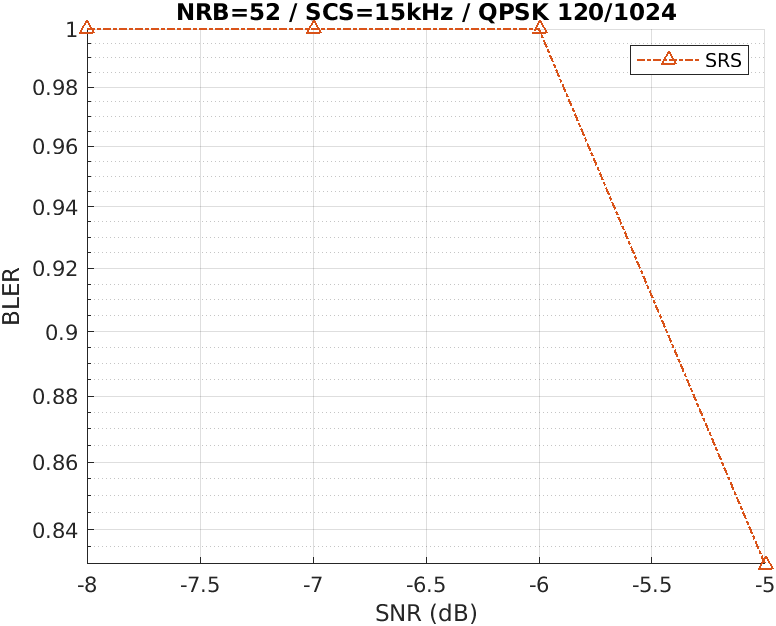
|